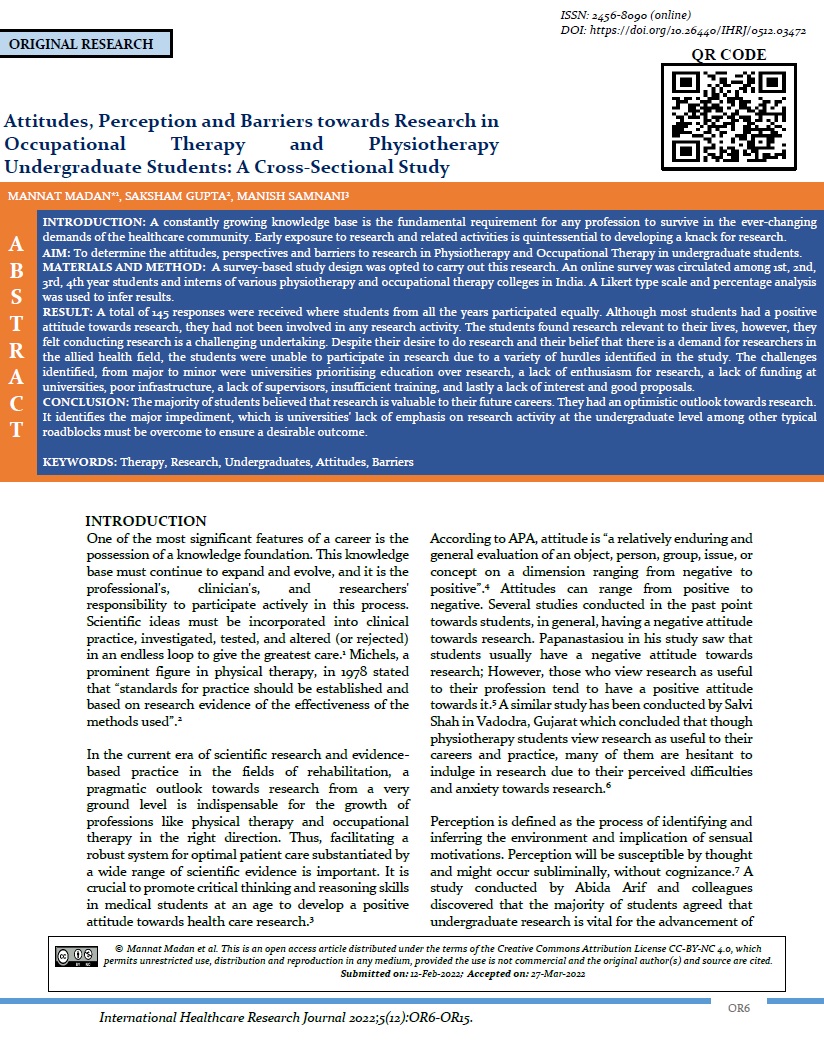Attitudes, Perception and Barriers towards Research in Occupational Therapy and Physiotherapy Undergraduate Students: A Cross-Sectional Study
Abstract
INTRODUCTION: A constantly growing knowledge base is the fundamental requirement for any profession to survive in the ever-changing demands of the healthcare community. Early exposure to research and related activities is quintessential to developing a knack for research. AIM: To determine the attitudes, perspectives and barriers to research in Physiotherapy and Occupational Therapy in undergraduate students. MATERIALS AND METHOD: A survey-based study design was opted to carry out this research. An online survey was circulated among 1st, 2nd, 3rd, 4th year students and interns of various physiotherapy and occupational therapy colleges in India. A Likert type scale and percentage analysis was used to infer results. RESULT: A total of 145 responses were received where students from all the years participated equally. Although most students had a positive attitude towards research, they had not been involved in any research activity. The students found research relevant to their lives, however, they felt conducting research is a challenging undertaking. Despite their desire to do research and their belief that there is a demand for researchers in the allied health field, the students were unable to participate in research due to a variety of hurdles identified in the study. The challenges identified, from major to minor were universities prioritising education over research, a lack of enthusiasm for research, a lack of funding at universities, poor infrastructure, a lack of supervisors, insufficient training, and lastly a lack of interest and good proposals. CONCLUSION: The majority of students believed that research is valuable to their future careers. They had an optimistic outlook towards research. It identifies the major impediment, which is universities' lack of emphasis on research activity at the undergraduate level among other typical roadblocks must be overcome to ensure a desirable outcome.
Downloads
References
Kitty K, Kristina T. Do occupational therapy and physiotherapy students care about research? A survey of perceptions and attitudes to research. Scandinavian Journal of Caring Sciences 2001;15:295–302.
Michels E. Evaluation and research in physical therapy. Physical Therapy 1982; 62:828–34.
Arif A, Siddiqui MA, Aziz K, et al. Perception towards research among undergraduate physical therapy students. Biom Biostat Int J. 2018;7(3):171–5. https://doi.org/10.15406/bbij.2018.07.00206
attitude – APA Dictionary of Psychology, https://dictionary.apa.org/attitude [Last accessed on January 1st, 2022].
Papanastasiou EC. Factor structure of the “attitudes toward research” scale. Statistics Education Research Journal. 2005; 4(1): 16-26.
Shah S. Attitude and anxiety of physiotherapy students towards research: A cross-sectional survey. VIMS journal of physical therapy 2019;1:2–9.
Saini M, Kumar A, Kaur G. Research Perception, Motivation and Attitude among Undergraduate Students: A Factor Analysis Approach. In: Procedia Computer Science. Elsevier B.V., 2020, pp. 185–192.
Vairamani CR, Akoijam BS. Knowledge, attitude and perceived barriers towards conducting research among students in a medical college, India. Int J Community Med Public Health. 2018;5:806–10.
Connolly BH, Lupinnaci NS, Bush AJ. Changes in attitudes and perceptions about research in physical therapy among professional physical therapist students and new graduates. Physical Therapy 2001; 81: 1127–1134.
Sheth MS, Shah NP, Rangey PB. Knowledge, attitude and perception of post-graduate physiotherapy students towards research. International Journal of Current Advanced Research 2019; 8: 19099–102.
Mosey AC. The competent scholar. The American journal of occupational therapy : official publication of the American Occupational Therapy Association 1998; 52: 760–4.
Abreu BC, Peloquin SM, Ottenbacher K. Competence in scientific inquiry and research. The American journal of occupational therapy : official publication of the American Occupational Therapy Association 1998;52:751–9.
Karlsson U, Törnquist K. What do Swedish occupational therapists feel about research? A survey of perceptions, attitudes, intentions, and engagement. 2009; 14: 221–9. https://doi.org/101080/11038120601111049
Faiza A, Hussain S. Attitudes towards research among undergraduate students:An exploratory survey. In book: New Research Trends (qualitative and quantitative research). Publisher: house of journals-Pune House of Journals, pp.198-206.
VanderKaay S, Moll SE, Gewurtz RE, et al. Qualitative research in rehabilitation science: opportunities, challenges, and future directions. Disability and Rehabilitation 2018;40:705–13.
Profetto-McGrath J. Critical thinking and evidence-based practice. Journal of professional nursing : official journal of the American Association of Colleges of Nursing 2005;21:364–71.
Dyson J. Research: promoting positive attitudes through education. Journal of advanced nursing 1997; 26: 608–612.
Fineout-Overholt E, Melnyk BM, Schultz A. Transforming health care from the inside out: advancing evidence-based practice in the 21st century. Journal of professional nursing: official journal of the American Association of Colleges of Nursing 2005; 21: 335–44.
Pighills AC, Plummer D, Harvey D, et al. Positioning occupational therapy as a discipline on the research continuum: Results of a cross-sectional survey of research experience. Australian Occupational Therapy Journal 2013;60:241–51.
Thomas A, Law M. Research utilization and evidence-based practice in occupational therapy: A scoping study. American Journal of Occupational Therapy 2013;67:e55–e65.
Balakas K, Potter P, Pratt E, et al. Evidence Equals Excellence: The application of an evidence-based practice model in an academic medical center. The Nursing clinics of North America 2009;44:1–10.
Gill S, Levin A, Djurdjev O, Yoshida EM. Obstacles to residents' conducting research and predictors of publication. Acad Med. 2001;76(5):477. https://doi.org/10.1097/00001888-200105000-00021. PMID: 11346527.
Pallamparthy S, Basavareddy A. Knowledge, attitude, practice, and barriers toward research among medical students: A cross-sectional questionnaire-based survey. Perspectives in Clinical Research 2019; 10: 73–8.
Leasure AR, Stirlen J, Thompson C. Barriers and facilitators to the use of evidence-based best practices. Dimensions of critical care nursing: DCCN 2008; 27: 74–82.

Copyright (c) 2022 Stumper Thakar

This work is licensed under a Creative Commons Attribution-NonCommercial 4.0 International License.


